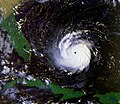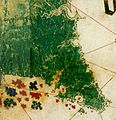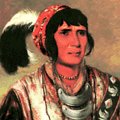Portal:Florida
The Florida Portal
Florida (/ˈflɒrɪdə/ ⓘ FLORR-ih-də; Spanish: [floˈɾiða]) is a state in the Southeastern region of the United States. It borders the Gulf of Mexico to the west, Alabama to the northwest, Georgia to the north, the Atlantic Ocean to the east, and the Straits of Florida and Cuba to the south. About two-thirds of Florida occupies a peninsula between the Gulf of Mexico and the Atlantic Ocean. It has the longest coastline in the contiguous United States, spanning approximately 1,350 miles (2,170 km), not including its many barrier islands. It is the only state that borders both the Gulf of Mexico and the Atlantic Ocean. With a population of over 23 million, it is the third-most populous state in the United States and ranks eighth in population density as of 2020. Florida spans 65,758 square miles (170,310 km2), ranking 22nd in area among the states. The Miami metropolitan area, anchored by the cities of Miami, Fort Lauderdale, and West Palm Beach, is the state's largest metropolitan area, with a population of 6.138 million; the most populous city is Jacksonville. Florida's other major population centers include Tampa Bay, Orlando, Cape Coral, and the state capital of Tallahassee. Various Native American tribes have inhabited Florida for at least 14,000 years. In 1513, Spanish explorer Juan Ponce de León became the first known European to make landfall, calling the region La Florida (land of flowers) ([la floˈɾiða]). Florida subsequently became the first area in the continental U.S. to be permanently settled by Europeans, with the settlement of St. Augustine, founded in 1565, being the oldest continuously inhabited city. Florida was frequently attacked and coveted by Great Britain before Spain ceded it to the U.S. in 1819 in exchange for resolving the border dispute along the Sabine River in Spanish Texas. Florida was admitted as the 27th state on March 3, 1845, and was the principal location of the Seminole Wars (1816–1858), the longest and most extensive of the American Indian Wars. The state seceded from the Union on January 10, 1861, becoming one of the seven original Confederate States, and was readmitted to the Union after the Civil War on June 25, 1868. Since the mid-20th century, Florida has experienced rapid demographic and economic growth. Its economy, with a gross state product (GSP) of $1.647 trillion, is the fourth largest of any U.S. state and the fifteenth-largest in the world; the main sectors are tourism, hospitality, agriculture, real estate, and transportation. Florida is world-renowned for its beach resorts, amusement parks, warm and sunny climate, and nautical recreation; attractions such as Walt Disney World, the Kennedy Space Center, and Miami Beach draw tens of millions of visitors annually. Florida is a popular destination for retirees, seasonal vacationers, and both domestic and international migrants; it hosts nine out of the ten fastest-growing communities in the U.S. The state's close proximity to the ocean has shaped its culture, identity, and daily life; its colonial history and successive waves of migration are reflected in African, European, Indigenous, Latino, and Asian influences. Florida has attracted or inspired some of the most prominent American writers, including Ernest Hemingway, Marjorie Kinnan Rawlings, and Tennessee Williams, and continues to attract celebrities and athletes, especially in golf, tennis, auto racing, and water sports. Florida has been known for being a battleground state in American presidential elections, although it has turned increasingly Republican in recent years. (Full article...) Selected article - Source: U.S. Geological Survey A national push for expansion and progress toward the latter part of the 19th century stimulated interest in draining the Everglades, a region of tropical wetlands in southern Florida, for agricultural use. According to historians, "From the middle of the nineteenth century to the middle of the twentieth century, the United States went through a period in which wetland removal was not questioned. Indeed, it was considered the proper thing to do." A pattern of political and financial motivation, and a lack of understanding of the geography and ecology of the Everglades have plagued the history of drainage projects. The Everglades are a part of a massive watershed that originates near Orlando and drains into Lake Okeechobee, a vast and shallow lake. As the lake exceeds its capacity in the wet season, the water forms a flat and very wide river, about 100 miles (160 km) long and 60 miles (97 km) wide. As the land from Lake Okeechobee slopes gradually to Florida Bay, water flows at a rate of half a mile (0.8 km) a day. Before human activity in the Everglades, the system comprised the lower third of the Florida peninsula. The first attempt to drain the region was made by real estate developer Hamilton Disston in 1881. Disston's sponsored canals were unsuccessful, but the land he purchased for them stimulated economic and population growth that attracted railway developer Henry Flagler. Flagler built a railroad along the east coast of Florida and eventually to Key West; towns grew and farmland was cultivated along the rail line. (Full article...) Did you know...
Selected quote -General images -The following are images from various Florida-related articles on Wikipedia.
Related portalsSelected biography -John Franklin Bolt (19 May 1921 – 8 September 2004) was a naval aviator in the United States Marine Corps and a decorated flying ace who served during World War II and the Korean War. He remains the only U.S. Marine to achieve ace status in two wars and was also the only Marine jet fighter ace. He rose to the rank of lieutenant colonel during his military career. Born to a poor family in Laurens, South Carolina, Bolt was a self-described "workaholic" and was involved in numerous groups and social activities throughout his life. After dropping out of the University of Florida for financial reasons in 1941, he joined the US Navy and trained as a Marine Corps pilot. Sent to the Pacific Theater of Operations, he flew an F4U Corsair during the campaigns in the Marshall Islands and New Guinea, claiming six victories against Japanese A6M Zeros. (Full article...) Selected images -Current events
WikiProjectsSelected panorama -Tampa is a United States city in Hillsborough County, on the west coast of Florida. It serves as the county seat for Hillsborough County. The population of Tampa in 2000 was 303,447. According to the 2006 Census estimate, the city has a population of 332,888. TopicsQuality content
1910 Cuba hurricane • 1928 Okeechobee hurricane • 2012 Budweiser Shootout • American white ibis • Andrew Sledd • Biscayne National Park • Derek Jeter • Draining and development of the Everglades • Ernest Hemingway • Everglades National Park • Falcon's Fury • Geography and ecology of the Everglades • George Floyd (American football) • Gregor MacGregor • Guy Bradley • Hogwarts Express (Universal Orlando Resort) • Hurricane Andrew • Hurricane Dennis • Indigenous people of the Everglades region • Iron Gwazi • John F. Bolt • Marjory Stoneman Douglas • Rosewood massacre • Sci-Fi Dine-In Theater Restaurant • SheiKra • Space Shuttle Challenger disaster • St. Johns River • Stephen Crane • TNA Turning Point (2008) • USS Massachusetts (BB-2) • Walt Disney World Railroad • William Cooley List of Daytona 500 winners • List of Florida hurricanes • List of Florida hurricanes (1900–1949) • List of Florida hurricanes (1950–1974) • List of Florida hurricanes (1975–1999) • List of Florida hurricanes (pre-1900) • List of Tampa Bay Rays seasons • List of University of Central Florida alumni • List of birds of Florida • List of counties in Florida • List of governors of Florida • List of invasive species in the Everglades • List of mammals of Florida • List of municipalities in Florida • Snow in Florida • United States presidential elections in Florida
| ||||||||||||















































![Image 9A Cuban sandwich is a variation of a ham and cheese sandwich that originated among the Cuban workers in the cigar factories in Key West, Florida[1][2]](http://upload.wikimedia.org/wikipedia/commons/thumb/f/fb/Key_West_Cuban_mix.jpg/120px-Key_West_Cuban_mix.jpg)























